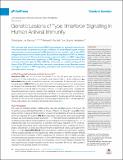Genetic lesions of type I interferon signalling in human antiviral immunity
Abstract
The concept that type I interferons (IFN-I) are essential to antiviral immunity derives from studies on animal models and cell lines. Virtually all pathogenic viruses have evolved countermeasures to IFN-I restriction, and genetic loss of viral IFN-I antagonists leads to virus attenuation. But just how important is IFN-I to antiviral defence in humans? The recent discovery of genetic defects of IFN-I signalling illuminates this and other questions of IFN biology, including the role of the mucosa-restricted type III IFNs (IFN-III), informing our understanding of the place of the IFN system within the concerted antiviral response. Here we review monogenic lesions of IFN-I signalling pathways and summarise the organising principles which emerge.
Citation
Duncan , C J A , Randall , R E & Hambleton , S 2021 , ' Genetic lesions of type I interferon signalling in human antiviral immunity ' , Trends in Genetics , vol. 37 , no. 1 , pp. 46-58 . https://doi.org/10.1016/j.tig.2020.08.017
Publication
Trends in Genetics
Status
Peer reviewed
ISSN
0168-9525Type
Journal item
Description
Funding was provided by the Wellcome Trust [211153/Z/18/Z (C.J.A.D.), 207556/Z/17/Z (S.H.), 101788/Z/13/Z (R.E.R.)], Sir Jules Thorn Trust [12/JTA (S.H.)], and the British Medical Association (C.J.A.D).Collections
Items in the St Andrews Research Repository are protected by copyright, with all rights reserved, unless otherwise indicated.

